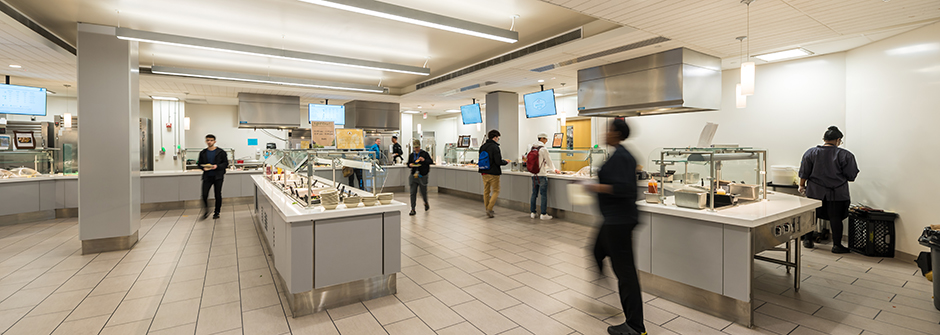
Sustainability Commitment
Seton Hall University integrates environmental stewardship into its core mission, guided by Catholic Social Teaching and the principles of Laudato Si′. The University Environmental Sustainability Committee—formed in October 2023—drives initiatives rooted in Pope Francis’s seven‑goal Action Plan, including responding to the cry of the earth and adopting sustainable lifestyles. Learn more about the University’s Environmental Sustainability Mission and Committee here.
In dining, Seton Hall partners with Gourmet Dining Services to advance sustainable food systems: reducing waste, promoting plant‑rich meals, and strengthening community engagement through food justice and rescue efforts.
Food Waste Reduction
Over the years, Gourmet Dining, in partnership with the Office of Business Affairs, has taken significant steps to reduce waste and promote sustainability within Seton Hall’s Dining Services. In the Pirate Dining Room, reusable plates, cups, and silverware are used to limit single-use paper and plastic waste. Straws are not provided, and napkins are made from recycled, compostable materials. To help reduce food waste, trays have been removed and smaller plates are offered—encouraging diners to take only what they need. In addition, used cooking oil is collected and recycled.
In 2024, Gourmet Dining launched the Waste Not 2.0 food waste tracking program to identify and measure where waste could be further minimized. Using insights from this program, the University selected and sized an aerobic biodigester that will convert food waste into a nutrient-rich soil amendment. This closed-loop system will be used on campus grounds, reducing both the cost and environmental impact of hauling waste offsite and importing soil.
Donation via Table to Table
Gourmet Dining has also partnered with student volunteers from the Food Recovery Network and, most recently, with Table to Table, to rescue surplus prepared food and deliver it to local organizations serving those in need.
- Biweekly Food Rescue Program: Seton Hall donates prepared but unused meal trays—like baked chicken or meatballs—from Gourmet Dining Services to Table to Table, New Jersey’s leading food rescue partner.
- Student and Staff Collaboration: Local volunteers (e.g., members of student organizations and the Food Recovery Network Club) mobilize to deliver meals to shelters such as the Jesus Saves boarding house in Newark. The initiative is co-led by graduate student Shayne Simmons with Committee oversight.
Learn more about the partnership with Table to Table here.

